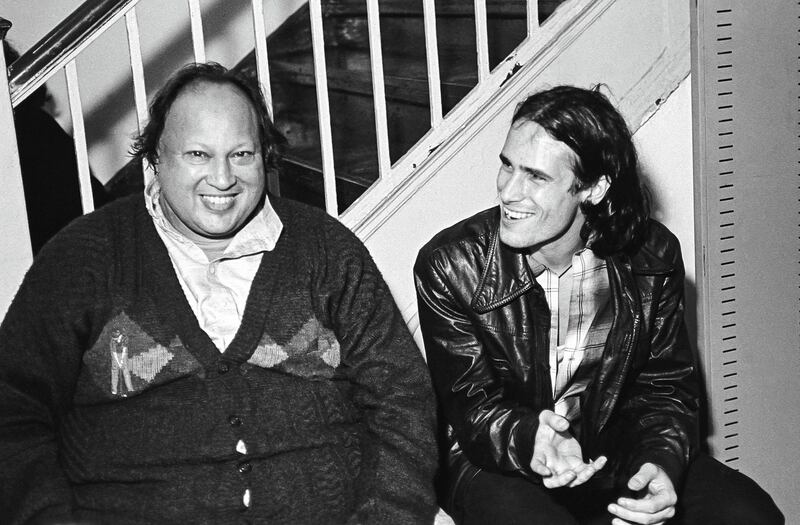Having managed Jeff Buckley for "44 unforgettable months" prior to the fabled singer's death in Memphis, Tennessee in 1997 (he drowned while swimming in the Mississippi river fully clothed), music business veteran Dave Lory is well-placed to shed new light on the short, incandescent life of his subject. His heartfelt, eminently readable book with British writer Jim Irvin certainly does so, even if events in Lory's own life occasionally seem a little too focal.
By the time of his death at the age of 30, Buckley was one of the most celebrated singer-songwriters of his generation. This was largely thanks to his 1994 debut album, Grace, his only non-posthumous studio release. If you were a music journalist in the late 1990s, you got used to seeing Buckley mentioned as an influence, while today, everybody knows his definitive cover-version of the Leonard Cohen song Hallelujah.
Click to listen to Hallelujah:
Reading Jeff Buckley: From Hallelujah To The Last Goodbye, it's clear that Lory had his work cut out managing the singer. For while he was forever seducing all in his orbit with his talent, charisma and good looks, Buckley was also riddled with self-doubt and some wholly understandable trust issues.
This was partly because he’d only met his famed and estranged singer-songwriter father Tim Buckley once prior to Tim dying of a heroin overdose in 1975 aged 28. Further, Buckley Jr’s itinerant childhood with his mother Mary Guibert made it difficult for him to make lasting friendships. He was a complex mix of openheartedness and guard-always-up. Having been let down, he sometimes let others down, too.
At the start of the book, Lory details Buckley being 45 minutes late for their first meeting. But when Lory delivers some home-truths, Buckley respects him for it and the pair soon bond over their mutual love of Van Halen (Buckley’s famously eclectic musical tastes also took in artists such as Edith Piaf, and the Pakistani singer Nusrat Fateh Ali Khan, whom Buckley described as “my Elvis”).
Further in, after Lory pledges to be there for Buckley come what may, there’s a hugely telling moment. Lory suffers a collapsed lung and ends up at Cedars Sinai Hospital, Hollywood, and Buckley is initially sympathetic when visiting his manager. Ultimately, though, he can’t help but make it about himself: “Are you going to die on me?” he asks Lory. “Are you going to leave me like everybody does?”
Throughout the book, Lory records supplementary anecdotes and insights from the musicians and record company employees who knew Buckley best. It's Matt Johnson, the drummer who played on Grace, who captures the magic of Buckley's mesmerising four-octave range best: "To this day, I don't know of any singer who used as much of the potential of the human voice as Jeff did," Johnson says. "[He went from] incredible serrated screaming and punishing scowls to very ribbon-like, serene, very pure passages of melody…"
Click to listen to Grace:
By all accounts, Buckley's musical gifts were near superhuman. As well as being able to mimic Robert Plant and James Brown with uncanny precision, he could play guitar, bass and drums very well. He also turned his falsetto to Henry Purcell's 17th century aria Dido's Lament, a work thought beyond the reach of non-classically-trained singers until Buckley nailed it at London's Meltdown Festival in 1995.
But where certain fundamental life skills were concerned, some of those who knew Buckley best thought the singer was lacking: "Jeff didn't know how to take care of himself because of how he was brought up," says photographer and confidante, Merri Cyr. "He didn't care what he ate and he was still living out of paper bags. [He had this] waif persona; the little boy with a big 'help me' thing."
Lory and Irvin detail Buckley's fear of overt commercialism: he tended to sabotage or sit-upon songs Columbia Records might earmark as single choices, and he also told Lory he wanted to "uglify" himself when, in May 1995, People magazine named him one of the 50 Most Beautiful People In The World. Similarly, when Hollywood came calling with a role starring alongside Barbara Streisand in the film The Mirror Has Two Faces, Buckley immediately declined.
__________________
Read more:
Leonard Cohen: a unique voice that spoke to our strained spirits
Why Kendrick Lamar's Pulitzer win means so much
In an age of instant access and Spotify, is ‘world music’ dead?
__________________
The book also explores Buckley's ever-problematic relationship with his father, the star that everyone insisted upon comparing him to and asking him about, despite Buckley's obvious and understandable unease. Lory recalls one show in La Luna, Portland, where, having been repeatedly heckled by Tim Buckley fans and asked by an audience member to perform his father's classic song Buzzin' Fly, Jeff could take no more: "Listen, I'd appreciate it if you forgot about my father", he says. "He was never there for me. I didn't know him. I didn't even go to his funeral."
With Buckley dying aged 30, this is another of those books with a terrible page-turning momentum. When it comes, Lory's account of how he heard about his charge's drowning is both masterful and moving. "Is my lung about to give out again?", he wonders, having taken the call in a Dublin hotel room at 5.58am. Two days later, when he flies to Memphis to see for himself the muddy stretch of the Mississippi where Buckley drowned, Lory lets out a cry so loud that he pulls a muscle in his throat.






